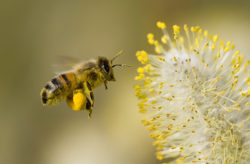Stinging Insect Allergies
 Insect Sting or Bite Allergies usually produce only local irritation and discomfort. However, for an unlucky few, about 1% of us injected with insect venom during a sting can have more serious consequences. Reactions can range from large local responses to death due to an allergy to the venom.
Insect Sting or Bite Allergies usually produce only local irritation and discomfort. However, for an unlucky few, about 1% of us injected with insect venom during a sting can have more serious consequences. Reactions can range from large local responses to death due to an allergy to the venom.
Some patients have symptoms of an allergic reaction to insect bites and insect stings. Some of these are insect bites from mosquitoes, horse flies, or deer flies. Usually they do not need any testing or treatment except antihistamines. It is very rare that someone has a severe allergic reaction with insect bites. However, we do see large local reactions to mosquito bites.
The more severe reactions are due to insect stings. There are five insects in this part of the country that can cause severe reactions including life threatening anaphylaxis. The most common is yellow jacket, and two other insects called hornets. These three belong to the same family. The honey bee belongs to a different family, and usually, when a patient is stung by a honey bee, it leaves a stinger. Wasp is the fifth insect, and there is some cross reaction between the wasp, the yellow jacket and hornet venoms. The most common reaction with these insects is a local reaction, and we do not recommend any medical treatment. One percent of these patients ultimately may develop severe allergic reactions, but the incidence is no different than the general population.
The second most common reaction is a large, local reaction. Usually the swelling gets worse a few hours later. This is treated with antihistamines and occasionally oral steroids if the swelling is very large. In general, they do not need allergy testing or desensitization.
The third reaction, which is not common but is life threatening, is a systemic reaction with hives, itching all over the body, swelling of the throat, wheezing and hypotension. Adults are at a higher risk than children for fatal reaction. Children with skin reaction only (hives), are not at higher risk and do not need testing or treatment; however, adults that have a systemic reaction and children that have systemic symptoms involving the respiratory, gastrointestinal or cardiovascular system must be tested and need desensitization. Both children and adults in this category need to carry an epinephrine kit and know how and when to use it.
Management
- Seek immediate medical treatment if you experience itching, hives, dizziness, wheezing, nausea, stomach cramps, or diarrhea.
- All patients who have generalized reactions should keep an Epi-Pen to use in case of a severe reaction and seek immediate medical treatment.
- All patients who have had a generalized (systemic) reaction, should have skin testing with insect venom.
- Desensitization with insect venom is recommended to those who reacted to skin testing. Studies show that 95% of patients treated with insect venom injections gained protection. When these patients were re-stung after several months of therapy, only 5% experienced a significant reaction.
Prevention
As with other types of allergic disease, prevention is the key to staying healthy. Certain precautions can be taken to reduce the risk of an insect sting during the summer months:
- Wear long-sleeved shirts and full-length pants with socks and shoes when outdoors.
- Remove known stinging insect nests from areas around your home. This is best done by a professional exterminator.
- Avoid areas that attract such insects, such as brightly colored flowers.
- DO NOT wear perfume or cologne.
- DO NOT wear pastel or brightly colored clothing. Wear muted greens, white and khaki.
- Keep lids on garbage cans.
- DO NOT drink from opened soda or juice cans where you cannot see what is inside.
- Check your car for insects before you get in. Then, drive with your car windows and sunroofs closed.
Click on the providers’ images below to learn more about our Allergy team.
Providers in this Specialty

Vivek Agarwal, MD
Allergy / Immunology, Asthma
